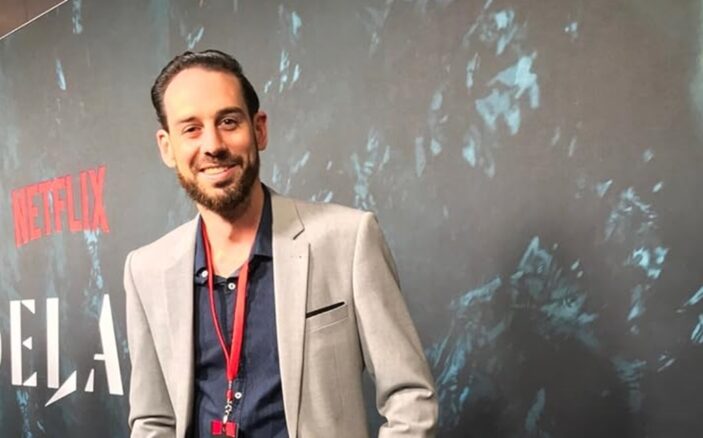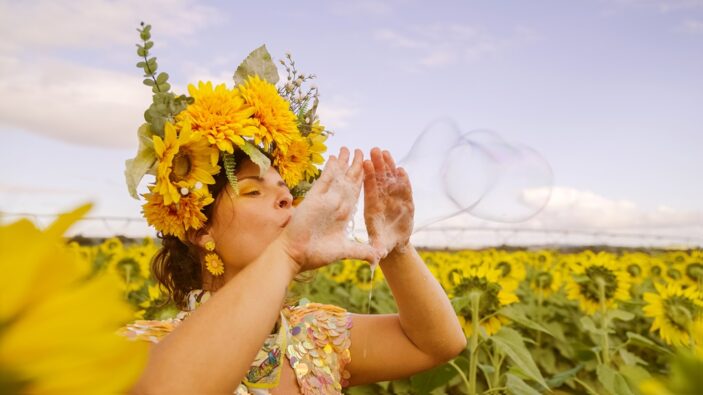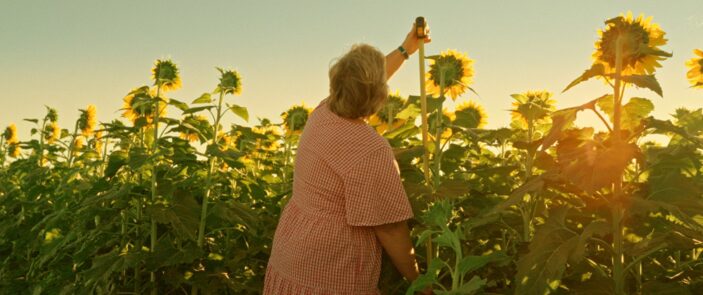
In the heart of the unforgiving Outback, a relentless drought tightens its grip on the land and small town of Kalbar, Queensland. Two resilient farmers, Jenny and Russell Jenner, hatch a daring plan in an attempt to save their dying town. Undeterred by the seemingly insurmountable odds, they rally the community to stage a vibrant Sunflower Festival, an audacious celebration against nature’s harshness. As sunflowers bloom, so does hope, and their small idea not only rejuvenates the spirits of the town but sends ripples of happiness on an International scale, demonstrating the extraordinary power of optimism in the face of adversity.
Documentary filmmaker Neil McGregor captured Jenny and Russell’s story of perseverance in Growing Happiness. Inducted into the Australian Directors Guild, and an integral name in securing Australian locales for international productions, including Aquaman and Thor: Ragnarok, McGregor’s prowess behind the camera extends beyond mere storytelling, and it’s his attention to such detail that assists in his films showcasing such beauty.
Following its acclaimed reception at this year’s Gold Coast Film Festival, and as it sets a screening at the Vision Splendid Outback Film Festival, Peter Gray spoke with Neil about what made him want to tell this story specifically, how he overcame the obstacles in his way, and the unlikeliest connection made between sunflowers and the man who attempted to assassinate Ronald Reagan.
One of the great things about Growing Happiness from an audience point of view is that this could potentially be opening people up to learning something new. For you, where did this idea originate? What was it about sunflowers and the Jenners that made you want to tell this story?
I went into this with no understanding of sunflower farming. When you’re in the film industry you meet people from all walks of life, and I always think that it’s such a humbling experience with documentary filmmaking, because you’re stepping into other people’s lives. You seem them at their best and their worst. Their most vulnerable. And you get to be a part of that journey.
In terms of where this story started, to go on that journey with Jenny and Russell, I stumbled across their website which was talking about the festival they were planning. Tickets had not gone on sale yet. The cinematographer was thinking of buying tickets, and I had never heard of a sunflower festival. I read the story about how they were hoping to boost spirits in their town after it had suffered a huge drought. As you see in the film that Jenny mentions how people were trespassing across these sunflower fields to see, she thought why not try and save the town and make something of it. I just thought that that was such a fascinating catalyst.
When I drove out to meet them I was just expecting to see sunflowers. As you’re driving through it just seems like such a foreign planet. You’re thinking “How can anything grow here?” Russell expected me to have cameras with me, and I just wanted to see if this story was going to be anything first. Just seeing their dynamic and how they spoke, very quickly I saw they were characters we could resonate with. And then there was that classic Aussie underdog (theme). They had set themselves this impossible task to achieve. There was definitely something there (to tell).
I think when they had sold out (tickets) in, like, a day I thought it could go into Fyre Festival territory. But as the time went on it became about the rewarding happiness they were supplying other people. And as the world keeps tearing itself apart, a story like Growing Happiness is an important one to share.
It’s absolutely better to tell a story that has hope and happiness. As you said, as much as this could have been a Fyre Festival-like story, which would have been fascinating, you ultimately don’t want that to be the case here. We don’t need another Fyre Festival. During filming, was there anything that surprised you the most?
The “Why?” of the story was always pretty clear from the outset, but the journey that takes you there? There are things that we never could’ve envisioned. The locals in the town and seeing the differences in opinion, the Ukraine War and its connection was something we weren’t sure we should follow or not, and obviously Russell’s cancer diagnosis came completely out of left field, and these are the things you can never really anticipate. It’s always tricky.
We filmed a whole lot of different interviews with townspeople that were both positive and negative, but as we got into the edit we felt like we didn’t need these voices of opinion. It’s always important to paint the truth, but we felt like that opinion was already there. What Jenny and Russell were doing was brining happiness to others, even though there were so many obstacles in their way to prevent that, and, as a filmmaker, it made me even more inspired to tell the story correctly.

With those obstacles, were you ever worried that it would prevent the film from getting made?
We were committed to telling the story. Sometimes things don’t go the way you planned. When the weather event happened, the filmmaker in me thinks it’s great, because it’s conflict in the story. But then you also feel for Jenny and Russell, because it’s now a problem for them to solve. When it happened, we looked at it as a bit of a bridging gap between this year and next year, if they went ahead with it.
Sometimes you look at certain characters and their story and they don’t always have to achieve their goals. Sometimes if you understand your characters enough, it’s about creating a satisfying ending for the audience. That’s something I’ve always strived to be true with in my filmmaking. It may not be the ending they expected, but it’s important to give the story the full stop.
Russell and Jenny appear very open throughout the film. Was anything ever off limits?
When you go into something like this you have parameters set. They were very open. They told us about what areas they wanted to (broach). As a documentary filmmaker you have to push your agenda. You have to tell why it’s important for them to share. But you have to respect their wishes too, whether you want to or not. I was a bit of an annoyance following them around on their farm. They would ask why I needed a shot of a tractor, and why that was important from certain angles, but you eventually become part of their journey. And vice versa.
You are invited in and become a little more subjective to their journey. When they have serious, troubling issues, you become more welcomed. Jenny and Russell were like that from the get-go. Nothing was off-limits. The only thing we did was, when Russell passed away, and our film was finishing, we pushed the film’s release (back) so we could let them grieve.
Was Russell able to see a finished cut of the film at all?
He did. When he passed away in August last year, our music composers were just pulling the last pieces of music. It was a very humbling (experience) to share the film with him before he passed.
And you have Jenny and Russell raising over $60,000 for Ukraine too. This movie really shows how amazing people can be when they show up to something and support a cause. It’s people going outside and supporting local art, which in these post-COVID times feels even more revolutionary.
It warms the soul. Part of the beauty of the movie is reminding audiences about the happiness in the world, and we take them on that journey. Me, as a filmmaker, I chose to explore that. And this whole experience is not just given away, it’s earned. I think that’s what’s important.

As a filmmaker I understand that going forward you’ll be moving in an entirely different direction. If I’m correct you’ll be exploring the assassination attempt on Ronald Reagan?
It’s a very different gear shift. Very far from sunflowers as you can get. It’s probably got a lot to do with my approaching style for projects. Many directors will try and put their thumb print on their style for the story. Whereas with me, and I’ve worked on some big films with big directors, but one of the things I’ve learned to do the story justice is you have to have the most authentic approach.
As I was exploring music ideas (for Growing Happiness), I was looking for folksy-type music for montage sequences, and you get taken on that algorithm rabbit hole on YouTube. I had some music on in the background and this Bob Dylan cover came up. It was that “Hi, I’m so-and-so and here’s my cover…”, and I heard it and thought it was actually a pretty great Dylan cover. When I looked at the name I saw it said John Hinckley, and I wondered where I had heard that name. I Googled it and saw that John Hinckley had mental health issues, was obsessed with the movie Taxi Driver, stalked Jodie Foster and tried to win her love, and shot the President of the United States. And he’s a free man now and wants to be a musician. That is something!
The music composers for Growing Happiness had actually done the music for Martin Scorsese’s film Silence, and Scorsese directed Taxi Driver, so there was this weird connection. I thought to myself though, “How’s a guy from Australia going to get this story?”
Back before I directed films, I actually did location scouting for productions. I’d drive around producers or whoever and I would sleuth to see where we could shoot. If certain houses were free. Who do I need to talk to, who the stakeholders are, things like that. And I got very good at that. And through that I was able to get in touch with the right legal person to connect me with John Hinckley. I asked the question about wanting to do a story on him and his music. His life story, his music, but also the more monstrous things he’s done. He had already started conversations with other people about telling his story. I told him that if anything falls through, get back to me.
A couple months later I decide to send a final e-mail. Before I closed the idea I just wanted to know if the film was still happening that he was in original conversations with. I got an e-mail from him the next day, I jumped on a Zoom call with him and we spoke about how I would approach it, and what he wants out of it. I remember thinking to myself, “What am I doing?”
I approached it in the same way I did Growing Happiness and with Jenny and Russell. It’s about humanising people. We’ve all done things we’re not proud of. We’ve all made mistakes. Maybe not as big as shooting the President of the United States. But I think with mental health, which is a very, very complex issue, and it’s not something physical that people can see, so the judgement comes differently from people. We worked out some dates, and we got some support from one of the screen agencies for development funding, went to the (US) and filmed for 6 weeks in Virginia with John.
We covered the Pandora’s Box of things that John had done. And with his music, it was about using that art as therapy for his rehabilitation. He spent 40 years in a mental health facility, because he was found not guilty on reason of insanity, and it was about taking the time to listen to him. It was about stepping into his life. We have some fascinating amazing footage, but it’s about an insight into humanity. And a film like that talking about a person like John leading into a Presidential election? Maybe it’s good marketing.
Growing Happiness is screening as part of this year’s Vision Splendid Outback Film Festival, running between the 21st and 29th June, 2024. For more information on the festival, head to official site here.
